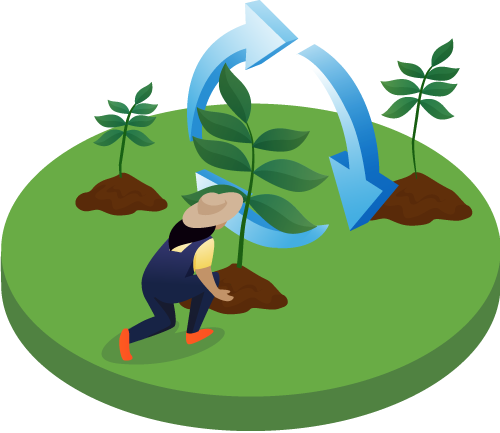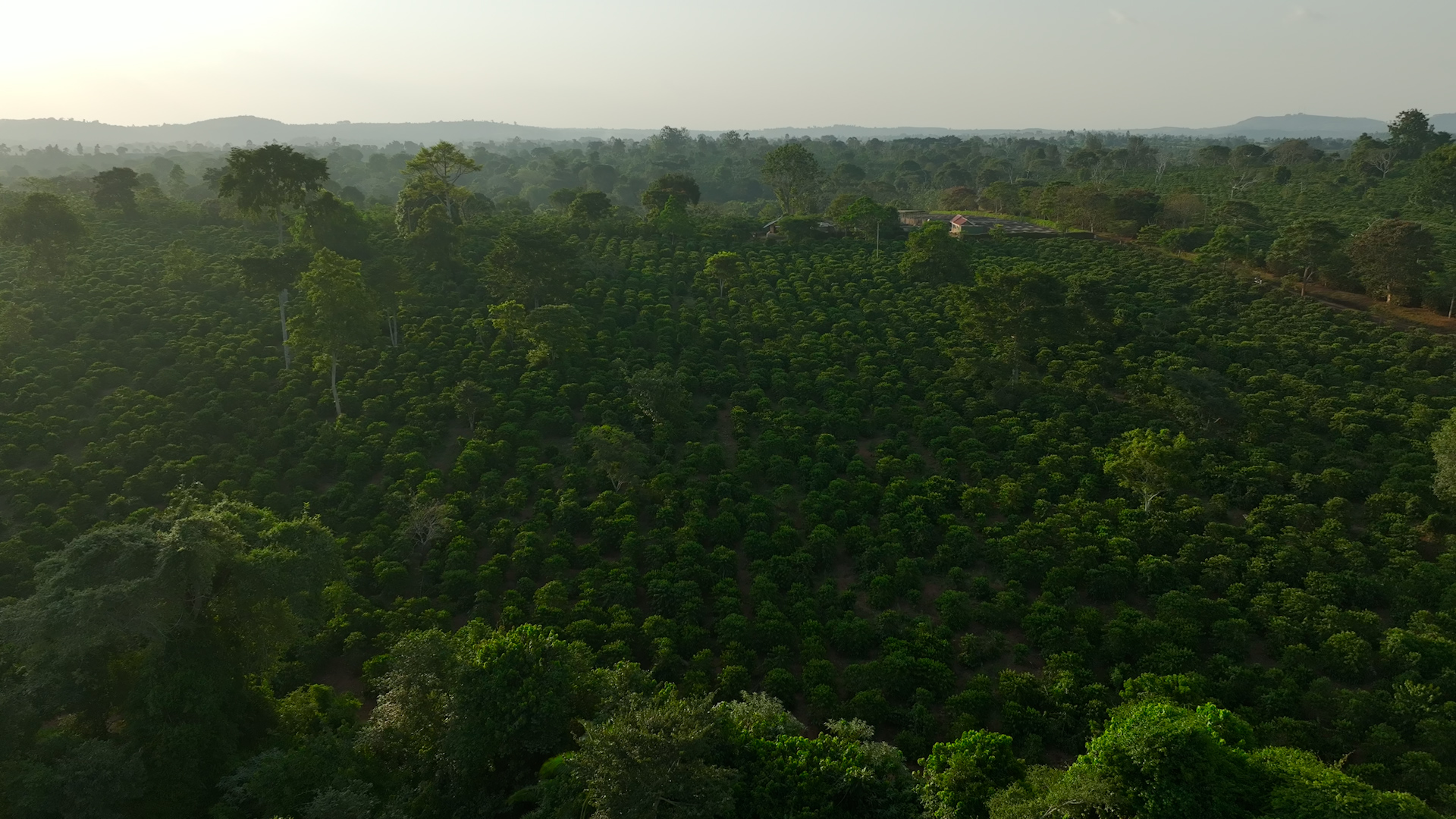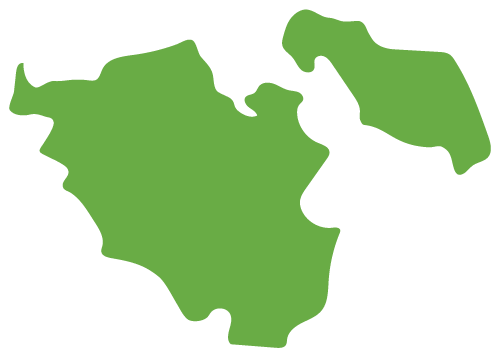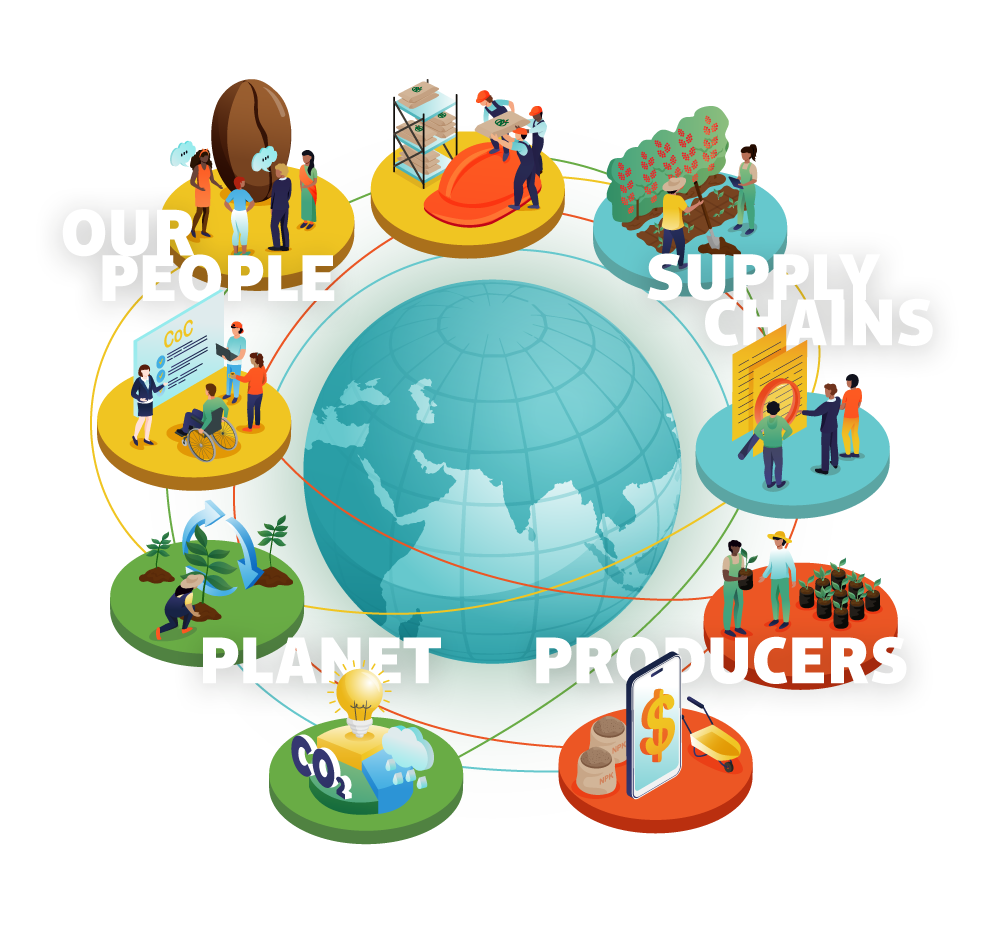Planet

9
PROMOTE ENVIRONMENTALLY FRIENDLY AND RESILIENT COFFEE FARMING PRACTICES
Since we began our journey towards improving our environmental performance as a group in 2022, aligning farm operations with current sustainability standards has been a key objective of our Responsible Business Program (RBP). Amidst our environmental efforts, we have encountered significant challenges, particularly regarding emissions from coffee farming. As a coffee trading company, it is imperative for us to recognize and address these challenges to ensure the resilience and sustainability of our operations. We have therefore designated our own three farms to serve as the testing grounds for innovative sustainability solutions, which are required to develop mitigation and adaptation measures for farmers across our supply chains.
coffee and Climate change
Climate change poses multifaceted challenges to coffee production, affecting its quality, sustainability, flavor, aroma and nutritional value. Elevated temperatures, altered rainfall patterns and heightened carbon dioxide levels have an impact on the essence of coffee cultivation, leading to decreased yields and economic losses for farmers. While bearing the brunt of climate change impacts, agriculture, forestry and other types of land use are also major emitters, accounting for around 20 % of global greenhouse gas (GHG) emissions1, making it crucial to reduce emissions from land-related activities.
At group level, the analysis of our corporate carbon footprint revealed that approximately 90 % of our overall greenhouse gas emissions as a group in scope 3 occur at farm level in our supply chains. Building on this, we have developed a comprehensive pathway that outlines the major sources of these emissions, as well as their potential for reduction, which highlights the importance of fertilizers and other coffee farming-related emissions. This plan aligns with the objective of limiting global warming to 1.5°C and advancing towards a net-zero future.
Scope 3 Emission Reduction Pathway
No Data Found
Focus on Fertilization
As illustrated in the graph above, the most significant emission drivers are fertilization, the fermentation process, land use changes, and fossil fuel usage for farming. Recognizing these drivers, we at NKG are working on gaining a better understanding of these drivers and assessing the suitability of different technical approaches in diverse coffee systems.
We scale the use of regenerative agriculture in coffee, meaning agricultural management practices that enhance soil health, reduce fertilizer use and create carbon sinks. These can look different depending on the coffee origin. In Brazil – a country with mechanized coffee production – trees (for example shade trees, windbreaks or fruit trees) at the edge of the coffee farm, or biochar carbon removal can be effective. In non-mechanized systems, for example in Indonesia or Papua New Guinea, agroforestry, the integration of perennial crops, cover crops and the use of leguminous plants can increase soil-based carbon sequestration.
We also aim to leverage negative emission technologies like biochar carbon removal, stretching from larger-scale technology in Brazil to medium scale in Colombia, down to smallholder levels in Vietnam. This technology can have a dual effect: it captures carbon and stores it in the soil while simultaneously enhancing soil characteristics, which decreases the need for fertilizers.
The use of inorganic fertilizer is a key driver of emissions; therefore, we aim to focus on how NKG is working to reduce emissions in this area. While part of a diverse set of interventions, efforts to minimize the reliance on these fertilizers are central in our journey to reduce our environmental footprint. The firsthand perspective at our NKG farms in Brazil, Uganda and Mexico enables us to explore different approaches to decrease fertilizer use, based on local requirements and conditions.

Our NKG farms

da Lagoa
Fazenda da Lagoa, located in Santo Antonio do Amparo in Minas Gerais, Brazil, recognized early on that reducing chemical fertilizers not only contributes to mitigating climate change, but also represents considerable potential for reducing production costs. To accomplish this, Fazenda da Lagoa now employs two supplementary approaches: precision fertilization and the use of honey water via fertigation (a combination of fertilization and irrigation).
The basis for ultra-precise fertilization involves an exact knowledge of the soil’s nutrient supply, which Fazenda da Lagoa achieves through comprehensive soil analyses and satellite-based remote sensing. These precise soil fertility maps enable Fazenda da Lagoa to use GPS-based fertilizer spreaders to apply fertilizer only where there is an undersupply. Additionally, Fazenda da Lagoa integrates honey water, a nutrient-rich byproduct of the coffee-washing process, into their fertigation system. By using honey water to replace portions of chemical fertilizers, it is possible to return some of the nutrients removed from the fields back to the soil, thereby enhancing its fertility.
Finca la Puebla, located in the northeastern part of the state of Puebla (municipality of Xicotepec de Juárez), Mexico, has adhered to a stringent sustainability concept since joining NKG in 1995. While Finca La Puebla’s zero-insecticide practices already significantly reduce emissions in crop protection, the team is now also intensifying efforts to lower the use of chemical fertilizers.
A key part of Finca La Puebla’s strategy is a strict circular approach, wherein coffee pulp is completely returned to the coffee fields. This practice is especially beneficial for new plantations, as it replenishes soil nutrients and enhances overall soil health. The added organic matter improves soil structure and increases nutrient availability for the coffee plants.

la Puebla

Kaweri
Coffee Plantation
Kaweri Coffee Plantation (Kaweri) is the only large-scale coffee farm in Uganda, located about 200 km west of the capital, Kampala. Recently, Kaweri integrated the use of biochar to curb fertilizer levels, while also sequestering carbon. Biochar is produced when biomass is thermochemically converted under oxygen-limited conditions. In practical terms, this means that Kaweri pyrolyzes types of pruning wood and other types of organic matter – material that would usually be burned or go to waste – to produce char. The physical and chemical properties of this biochar can lead to an improvement in soil structure and thus to a better nutrient and water balance. Kaweri uses the biochar to produce carbonized compost, which is then spread on the coffee fields. While the improved soil and plant health leads to a reduced need for fertilizer, stable biochar also fixes carbon from the atmosphere in the soil.
Learning for our global supply chains
The journey towards environmental responsibility and agricultural innovation undertaken by Fazenda da Lagoa, Finca la Puebla and Kaweri is an ongoing effort with great success and a collective dedication to harmonizing the operations on our farms with nature. As demonstrated, the novel practices utilized at our three farms offer great potential for environmentally friendly and resilient coffee farming. The lessons learned motivate us to replicate innovative and climate-smart agricultural practices throughout our global supply chains. By transferring these validated methods to other supply chains in our diverse coffee origins, we aim to scale up practices that offer social and environmental benefits to producers and ensure the long-term viability of coffee production. In doing so, we try to strike the often difficult-to-achieve balance between sustainability and productivity. This strategy not only enhances the sustainability of our operations but also supports the well-being of our farming communities.
Regularly conducting comprehensive assessments to evaluate our current practices and explore opportunities for further improvement also helps us align our efforts with UN Sustainable Development Goals.
Reference
1 IPCC (2022): Climate Change 2022: Impacts, Adaptation, and Vulnerability. Contribution of Working Group III to the Sixth Assessment Report of the Intergovernmental Panel on Climate Change. Cambridge University Press, Cambridge, UK and New York, NY, USA. [Online]. Available at: https://www.ipcc.ch/report/ar6/wg3/chapter/chapter-7/
RELATED
sustainable
development
goals
